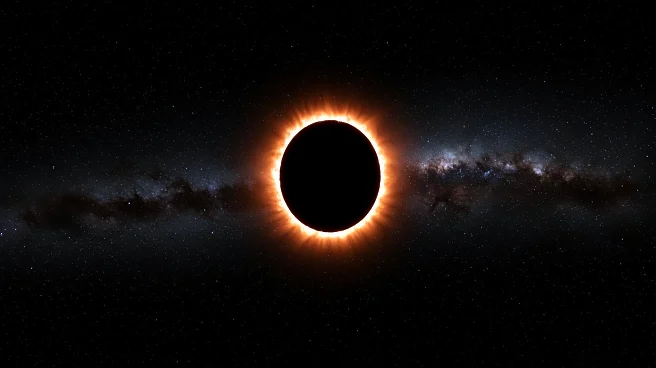What's Happening?
A total solar eclipse is set to occur on August 12, 2026, sweeping across parts of Spain, Iceland, and Greenland. This astronomical event will offer millions the opportunity to witness the moon fully blocking the sun, turning day into night along the path of totality. The eclipse will begin in the Arctic, cross Iceland, and reach Spain during the early evening. Cities like Valencia, Zaragoza, and Palma de Mallorca will experience up to two minutes of totality. The event marks Europe's first total solar eclipse in 27 years, generating significant excitement among eclipse chasers who are already planning their viewing strategies. The likelihood of clear skies and warm weather makes Spain a favored destination for many observers.
Why It's Important?
The 2026 total solar eclipse is significant as it provides a rare opportunity for scientific observation and public engagement with astronomy. Such events can boost tourism in the regions along the path of totality, as enthusiasts travel to witness the spectacle. The eclipse also serves as an educational moment, raising awareness about celestial phenomena and encouraging interest in science and space exploration. Economically, the influx of tourists can benefit local businesses, from hospitality to transportation, as they accommodate the increased demand. Additionally, the event highlights the importance of international collaboration in scientific research and public outreach.
What's Next?
As the eclipse approaches, preparations are underway to accommodate the influx of visitors to the regions along the path of totality. Local governments and tourism boards are likely to enhance infrastructure and services to manage the expected crowds. Scientific communities may organize public viewing events and educational programs to maximize the outreach potential of the eclipse. Additionally, travel agencies and tour operators are expected to offer specialized packages, including guided tours and cruises, to provide optimal viewing experiences. The event may also prompt discussions on the preservation of dark skies and the impact of light pollution on astronomical observations.
Beyond the Headlines
The 2026 eclipse could have long-term implications for the promotion of science education and public interest in astronomy. It may inspire future generations to pursue careers in science and technology, contributing to advancements in these fields. The event also underscores the cultural significance of celestial phenomena, as communities come together to share in the awe of the natural world. Furthermore, the eclipse may prompt discussions on the environmental impact of increased tourism and the need for sustainable practices to protect the natural landscapes that serve as backdrops for such events.









